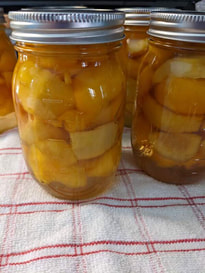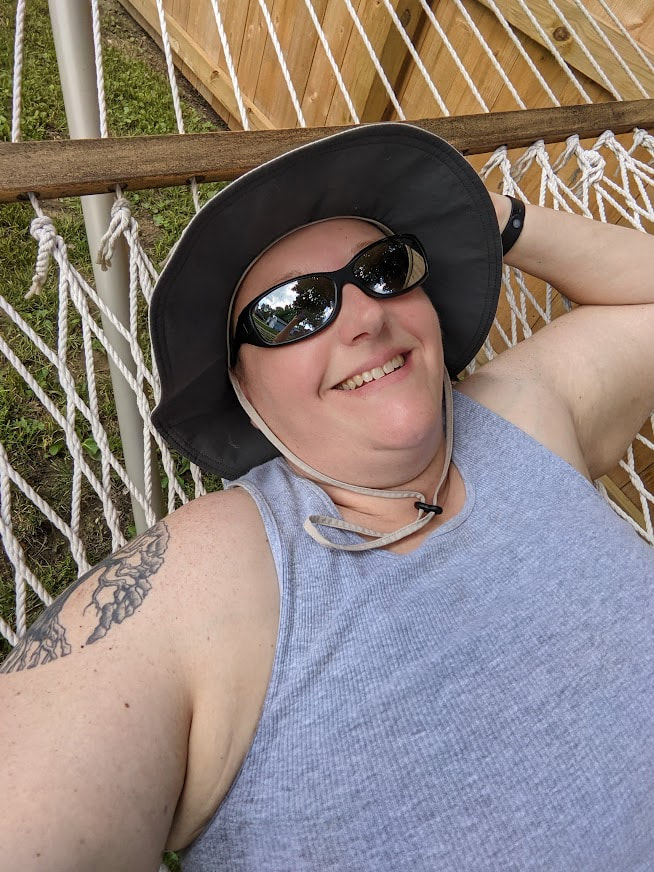 During vacation last week, my spouse and I put up about 20 lbs of peaches that we got from a local heritage farm. Once we had the peaches, the process was pretty simple: Peel, de-pit, slice, place in sterilized jars with a light syrup made of a simple water and sugar ratio. Then can the jars of peaches in a water bath for about 30 minutes. Remove the jars from the canner and wait for the glorious sounds of the metal lids to POP! The popping means the jar has been properly sealed for storage. The reason we put up things like peaches and pears and green beans and tomatoes and ALL of the delicious things we grow in our garden or get from local farmers we know is because, in addition to curb the effects of rising food costs on our household, we like to have control over what goes into our food. We want to know the people who grew the fruits or vegetables we didn’t grow ourselves. We want to learn of their farming practices. We want to be able to ask certain questions and trust the answers: Was this fruit sprayed with anything? How was the soil tended or treated? How did you deal with any pests? We can’t do this for everything we eat–particularly what we get in a restaurant or have to buy in a store–but we do it whenever we can. Which is interesting when I think about it because I am not nearly so discerning when it comes to what else I am taking in. That same day that we put up those beautiful heritage farm peaches, I had experienced about an hour of anxiety. Usually I know what’s causing an anxious moment or moments and I can tend to it, but at the time I had no clue. Looking back, I recounted the hour I spent on my phone, scrolling through social media, mindlessly taking in the perfect constructions of people’s lives that they put out for me to see. I looked at how they were spending their vacations and how their Friday nights were being spent, and then I looked at how I was spending my Friday night during my vacation. I started to compare what was–until that moment–exactly how I wanted to spend my Friday night during my vacation with the perfect constructions others were posting, and I started feeling inadequate…and less than. And in the swirl of those emotions, the anxiety set in. Perhaps this is exactly why Brene Brown says that “Comparison is the thief of happiness.” And it’s not just social media and the sanitized versions of others’ experiences that we are taking in, it’s also news stories and political ads (yes, already). It’s famous people sharing their opinions but not their wealth. It’s local politicians talking about making things beautiful without talking about making them safe for everyone. It’s the car accidents we pass on the highway and the person asking for money that we pass at the Walmart stop sign. We take it ALL in…often without a thought. And then we wonder when we get home why we have this constant sense of dread lingering around us. We feel anxious and isolated and powerless and often we aren’t at all sure why. Maybe it’s because of what we’re taking in? Now, I’m not at all advocating for us to hide our heads in the proverbial sand or to deny the situations unfolding around us, but I am suggesting that we all might benefit from developing a more discerning palette when it comes to what information or photographs or stories we allow into our consciousness. We might benefit from setting aside some time to research candidates in whatever political race is happening at the time so that we can turn off the ads when we see them. We might benefit from being more intentional about how often we watch the news, how long we allow ourselves to scroll through social media, and what conclusions we allow ourselves to draw from them. We might benefit from coming up–ahead of time–with a plan for what we can do (if anything) when we come upon a car accident–like call 9-1-1, do first aid, direct traffic until emergency personnel are there, or even just get out of the way–and then do those things when we see one. We might, if we are financially able, keep $10 or $20 in our vehicles to give to those asking for money when we see them or, if we can’t do that, we might keep the pastor’s cell phone number or the Ecumenical Cupboard hours on a sheet of paper in our glove boxes to offer as possible sources of help. In other words, it might benefit each of us to “put up” something--a plan, an intention, etc.--so that we can control what we are taking in and how we are taking it in from the world around us. And maybe that’s the challenge laid out for each of us: To find ways to “put up” goodness, kindness, compassion, service, faithfulness, justice, and love for when we find ourselves in need of them (which is nearly always). To construct our lives around questions of how we’re tending the soil of our hearts or treating the pests that enter our minds. Maybe the challenge is not so much about hiding or burying as it is about uncovering. Uncovering what we have control over and what we do not. Uncovering truths about ourselves and the world around us that we will never get from the local newscast. And, perhaps the most delicious of all, uncovering how God is already present in it all. Learning to put up more than just peaches with you, Pr. Melissa Comments are closed.
|
Rev. Melissa Sternhagen
Rev. Melissa Sternhagen was called as the pastor of St. Paul Congregational UCC in June of 2020. Prior to her call to St. Paul, Pr. Melissa worked as a hospice chaplain in the Ames, IA area, following pastorates at rural churches in Central Iowa and Southern Illinois. Pr. Melissa is a second-career pastor with a background in agribusiness and production & supply operations. She received her M.Div. from Eden Theological Seminary in St. Louis, MO, and holds a MA Ed. in Adult Education and Training, and a BA in Organizational Communications. Archives
July 2024
Categories |

 RSS Feed
RSS Feed
